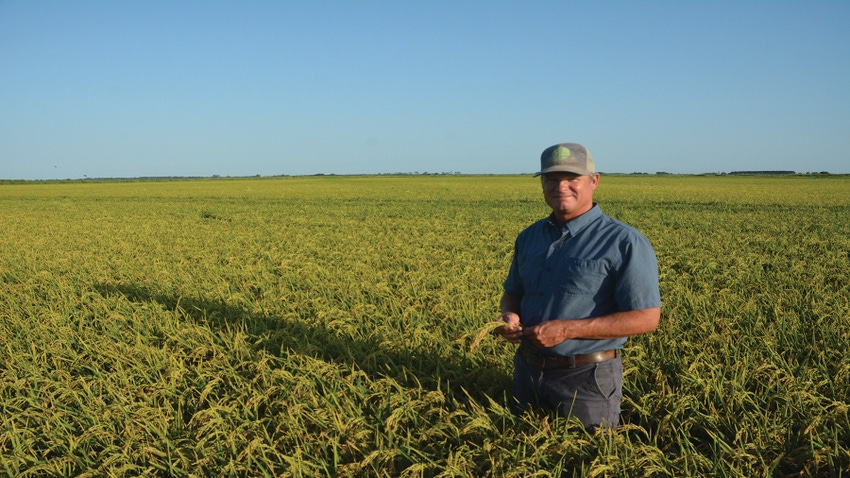
Rice farmers in Louisiana are mining a tiny sliver of silver lining the coronavirus pandemic: U.S. demand for jasmine rice.
Paul Johnson of Welsh, La., is one of the farmers tapping into the existing U.S. market. In 2023, he planted each of his 1,800 rice acres to jasmine.
“That was dictated by the markets,” the 2022 Rice Farmer of the Year said. “I wasn’t happy with the long grain market, and I knew that I could lock in a jasmine price.”
The U.S. market opened to domestic producers as a result of the supply chain disruptions that marked the pandemic and wreaked havoc on the economy. As businesses searched for supply, many realized for the first time that jasmine rice is grown in the United States. Once the domestic supply was on the radar, the next step for many was overcoming a bias toward rice grown in the traditional jasmine region in the Far East.
Without that disruption, Eunice, La., rice grower Michael Frugé believes the opportunity in the jasmine market would have been much harder to access. At a recent food show, Frugé discovered chefs from a major wholesale food distributor still didn’t know jasmine rice is grown domestically.
Frugé shakes his head when he recalls the conversation. But more rice farmers are nodding their heads at the opportunity.
Tapping into the domestic market
The opportunity is significant.
Long a staple of Far East cooking, particularly Thai cuisine, U.S. imports of jasmine rice were increasing by double digits going into the pandemic. The U.S. Department of Agriculture reported that imported rice from Thailand grew nearly 29 percent between 2018/19 and 2019/20. Most of that was due to the U.S. consumer’s appetite for jasmine rice.
“In recent years,” USDA reported in 2020, “80-85% of Thailand’s shipments to the United States has been its jasmine rice, a premium aromatic variety.”
At that time, Johnson says, he knew only two other farmers who were growing jasmine varieties.
Tim Walker, general manager of Horizon Ag, figures Louisiana farmers this season planted about 20,000 acres to jasmine rice, or close to 10 times what they planted in previous years.
Johnson, a premier grower for the Jazzman brand, started growing jasmine varieties in 2011. He grew a couple hundred acres that year and slowly increased that number to 1,100 in 2022. Moving to jasmine requires that a farmer shift perspective, Johnson said.
“Our industry focuses on yield,” Johnson said.
Grow for quality
That’s a perspective a farmer has to shift away from when planting jasmine varieties. It’s a shift to risk management and keen on quality that demands a premium.
The yield issue. “The yield is certainly less,” Johnson said.
The risk management opportunity. “But we’re forward contracting it,” he said. “We have that price locked in before we put a seed in the ground,” Johnson said.
And, finally, the profit factor. “The beauty of jasmine is that it commands a premium.”
The premium is an important business factor for farmers – and it’s essential that buyers understand premiums are essential to grow the domestic jasmine market, Johnson said.
“It’s hard to convince farmers to grow a variety that delivers quality but doesn’t yield as well and doesn’t pay a premium,” he said. “I see jasmine continuing to be in our rotation – and as long as it commands a premium, it will be a large part of our acreage.”
Jasmine quality boosts domestic reputation
Jasmine also offers U.S. rice farmers an opportunity to improve the reputation of their product. Many in the rice industry lament losing their reputation as “the gold standard” for quality. Johnson, Frugé and Richard are among them.
“We have issues in the rice industry,” Frugé said. “We’ve lost our gold standard for quality.”
“Our quality has dipped in the last 15 years,” Johnson said. “Other countries can grow rice cheaper than we can. They grow it without the regulation we have. And now they can grow it with quality that’s on par with ours.”
It’s up to the industry to change that. Frugé is developing a market with Parish Rice, an identity-preserved brand with high quality. Tapping into the jasmine market offers another opportunity to regain the U.S. reputation for quality rice.
“Jasmine is the start. I think it’s what we need in the United States right now,” Johnson said. “I think it sets a precedent for what we need to do.”
Rather than buying a bag of rice that may include several varieties, Kaplan, La., farmer Christian Richard said, consumers can be confident in what’s in a bag of jasmine rice. A sixth-generation rice farmer, Richard is growing jasmine for the first time this season.
“People like it because it’s identity preserved,” Richard said. “It’s the same every time you cook it.”
Johnson agrees. “Consumers are buying it for the aromatic qualities, for they’re seeing the quality,” he said. “Year to year, the quality is going to be there.”
Or be higher. With new varieties, Richard said, “it’s only going to get better.”
About the Author(s)
You May Also Like






